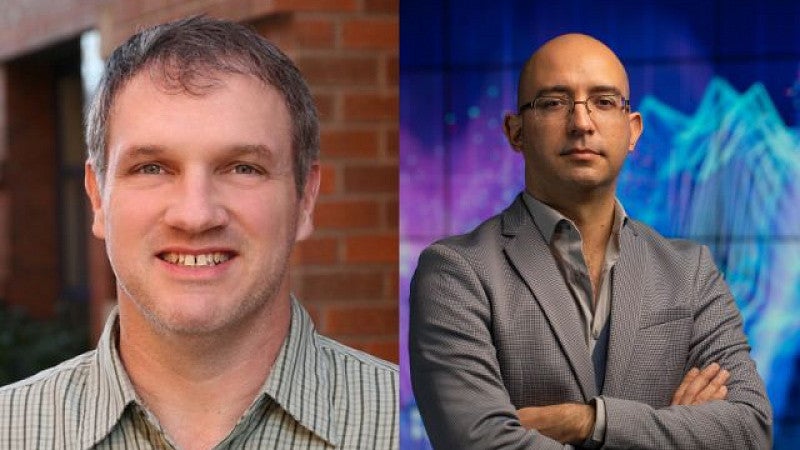
July 25, 2023 - 4:30 p.m.
Appearing on a radio forum program hosted by the Lane County-based NPR affiliate KLCC, two faculty members in the College of Arts and Sciences discussed the rising role of artificial intelligence in society.
The KLCC July 20 radio forum Oregon on the Record featured Department of Philosophy Assistant Professor Ramón Alvarado, Department of Computer Science Senior Instructor Phil Colbert, College of Law Clinical Professor Rebekah Hanley and local business owner Todd Edman.
AI has been around for decades, Colbert said. It’s in gaming and anywhere computers are used. AI technology like ChatGPT has been trained with a large amount of data that it analyzes and creates a response based on a prompt from a human.
One of the technological factors that have led to the recent explosive growth of predictive AI technology is a Netflix contest about 10 years ago, Alvarado said.
“Netflix had a competition to predict the next possible row of data that would be the most likely movie that we’d watch,” Alvarado said. “That created a blooming of machine learning to predict and come up with beautiful and complex algorithms that could look at the data and given this data, I’ll probably like Forrest Gump or whatever movie.”
AI technologies like ChatGPT have encroached on newer areas that were once thought of as requiring specialized skills, such as writing and coding. Colbert said he uses AI technology but he still has to know how to write code to make sure that what was generated is correct.
“If you have a writer and they use AI to generate the text, you should proofread and edit and at some point, you have to have the ability to say, ‘This is a good result,’” Colbert said. “It’s not a complete substitute.”
In the law school classroom, the rise of AI technology is an opportunity to re-examine writing policies and expectations from students. Hanley said that previous studies have shown that when students use AI technology, it boosts the bottom performers up but also lowers the top performers.
“I’m thinking of the students who have learned a lot but have a hard time articulating in writing,” Hanley said. “Now we have a tool that might demonstrate what they’ve learned in writing.”
But Hanley is worried that adding AI technology could have some problems. It could lead to loss of diversity of thought, the brainstorming process, deference to relying on the technology — and, of course, plagiarism.
AI tools are similar to tools, like a hammer or bulldozer, Alvarado said, and it’s how humans use it. His expertise is in data ethics, and what happens there is that people underestimate the long-term impact of new technologies and overestimate the short-term impacts.
“We’ve been worrying about writing and thinking for about 2,400 years in the West,” he added. “Socrates and Aristotle worried about writing, which he thought got in the way of thinking because the way you arrive at a truth is a conversation.”
To listen to the full conversation, visit KLCC’s website.
